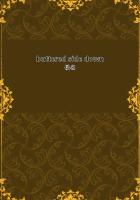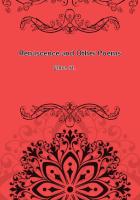At length however, I entered the neighbourhood of Grassdale. I approached the little rural church--but lo! there stood a train of carriages before it--it needed not the white favours bedecking the servants and horses, nor the merry voices of the village idlers assembled to witness the show, to apprize me that there was a wedding within. I ran in among them', demanding, with breathless eagerness, had the ceremony long commenced? They only gaped and stared. In my desperation I pushed past them, and was about to enter the church-yard gate, when a group of ragged urchins, that had been hanging like bees to the windows, suddenly dropped off and made a rush for the porch, vociferating in the uncouth dialect of their county, something which signified, `It's over--they're coming out!'
If Eliza Millward had seen me then, she might indeed have been delighted. I grasped the gate-post for support, and stood intently gazing towards the door to take my last look on my soul's delight, my first on that detested mortal who had torn her from my heart, and doomed her, I was certain, to a life of misery and hollow, vain repining--for what happiness could she enjoy with him? I did not wish to shock her with my presence now, but I had not power to move away. Forth came the bride and bridegroom.
Him I saw not; I had eyes for none but her. A long veil shrouded half her graceful form, but did not hide it; I could see that while she carried her head erect, her eyes were bent upon the ground, and her face and neck were suffused with a crimson blush; but every feature was radiant with smiles, and, gleaming through the misty whiteness of her veil, were clusters of golden ringlets! O Heavens! it was not my Helen! The first glimpse made me start--but my eyes were darkened with exhaustion and despair--dare I trust them? Yes--it is not she! It was a younger, slighter, rosier beauty--lovely, indeed, but with far less dignity and depth of soul--without that indefinable grace, that keenly spirituel yet gentle charm, that ineffable power to attract and subjugate the heart--my heart at least.
I looked at the bridegroom--it was Frederick Lawrence! I wiped away the cold drops that were trickling down my forehead, and stepped back as he approached; but his eye fell upon me, and he knew me, altered as my appearance must have been.
`Is that you Markham?' said he, startled and confounded at the apparition--perhaps, too, at the wildness of my looks.
`Yes, Lawrence--is that you?' I mustered the presence of mind to reply.
He smiled and coloured, as if half-proud and half-ashamed of his identity; and if he had reason to be proud of the sweet lady on his arm, he had no less cause to be ashamed of having concealed his good fortune so long.
`Allow me to introduce you to my bride,' said he, endeavouring to hide his embarrassment by an assumption of careless gaiety. `Esther, this is Mr. Markham, my friend Markham, Mrs. Lawrence, late Miss Hargrave.'
I bowed to the bride, and vehemently wrung the bridegroom's hand.
`Why did you not tell me of this?' I said reproachfully, pretending a resentment I did not feel (for in truth I was almost wild with joy to find myself so happily mistaken, and overflowing with affection to him for this and for the base injustice I felt that I had done him in my mind--he might have wronged me, but not to that extent; and as I had hated him like a demon for the last forty hours, the reaction from such a feeling was so great that I could pardon all offences for the moment--and love him in spite of them too).
`I did tell you,' said he, with an air of guilty confusion, `you received my letter?'
`What letter?'
`The one announcing my intended marriage.'
`I never received the most distant hint of such an intention.'
`It must have crossed you on your way then--it should have reached you yesterday morning--it was rather late, I acknowledge. But what brought you here then, if you received no information?'















